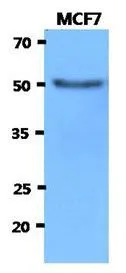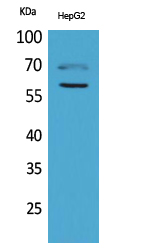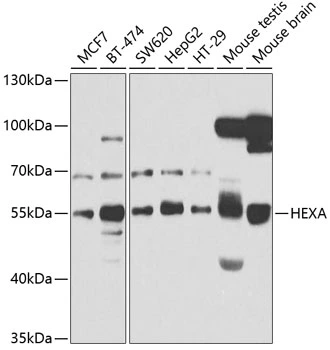
WB analysis of MCF7 lysate (40ug) using HEXA antibody at a dilution of 1:3,000.
HEXA antibody [AT20F1]
GTX53726
ApplicationsWestern Blot, ELISA
Product group Antibodies
ReactivityHuman
TargetHEXA
Overview
- SupplierGeneTex
- Product NameHEXA antibody [AT20F1]
- Delivery Days Customer9
- Application Supplier NoteThe antibody has been tested by ELISA, Western blot analysis to assure specificity and reactivity. Since application varies, however, each investigation should be titrated by the reagent to obtain optimal results. Recommended starting dilution is 1:3000.
- ApplicationsWestern Blot, ELISA
- CertificationResearch Use Only
- ClonalityMonoclonal
- Clone IDAT20F1
- Concentration1 mg/ml
- ConjugateUnconjugated
- Gene ID3073
- Target nameHEXA
- Target descriptionhexosaminidase subunit alpha
- Target synonymsTSD, beta-hexosaminidase subunit alpha, N-acetyl-beta-glucosaminidase subunit alpha, beta-N-acetylhexosaminidase subunit alpha, hexosaminidase A (alpha polypeptide), hexosaminidase subunit A
- HostMouse
- IsotypeIgG2a
- Protein IDP06865
- Protein NameBeta-hexosaminidase subunit alpha
- Scientific DescriptionThis gene encodes a member of the glycosyl hydrolase 20 family of proteins. The encoded preproprotein is proteolytically processed to generate the alpha subunit of the lysosomal enzyme beta-hexosaminidase. This enzyme, together with the cofactor GM2 activator protein, catalyzes the degradation of the ganglioside GM2, and other molecules containing terminal N-acetyl hexosamines. Mutations in this gene lead to an accumulation of GM2 ganglioside in neurons, the underlying cause of neurodegenerative disorders termed the GM2 gangliosidoses, including Tay-Sachs disease (GM2-gangliosidosis type I). Alternative splicing results in multiple transcript variants, at least one of which encodes a preproprotein that is proteolytically processed. [provided by RefSeq, Jan 2016]
- ReactivityHuman
- Storage Instruction-20°C or -80°C,2°C to 8°C
- UNSPSC41116161






![WB analysis of L1210 (1), and HL7702 (2) cell lysate using GTX60574 HEXA antibody [3F10].](https://www.genetex.com/upload/website/prouct_img/normal/GTX60574/GTX60574_20170912_WB_w_23061123_267.webp)
